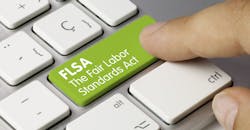Regulatory Update: DOL Mounts Essential Workers Protections Initiative
The U.S. Department of Labor (DOL) has announced its Essential Workers, Essential Protections Initiative designed to educate workers on the Fair Labor Standards Act (FLSA) and the Family and Medical Leave Act (FMLA).
The initiative seeks to protect workers in “occupations where workers are more likely to be the victims of wage theft or to work in environments that put them at risk of exploitation,” says the DOL Wage and Hour Division’s principal deputy administrator Jessica Looman.
Included is a new Web page containing links to federal employment resources and webinars that address topics such as “Federal Labor Laws and Workplace Rights,” “Essential Protections for Union Members and Representatives,” “DOL/WHD/OSHA Essential Protections,” and several state-specific laws.
Also provided are Frequently Asked Questions (FAQs) pages related to pay and sick leave. Topics include when an employer must pay employees for temperature checks and health screenings. Under the guidance, employers must pay for screenings before normal working hours when it is an “integral and indispensable” part of the employee’s jobs. And for those employees who complete health screenings during the workday, DOL says the time is always compensable.
The FAQs dive into more complex issues as well, according to attorneys Faith Whittaker and Thomas Cedoz of the law firm of Dinsmore & Shohl. For example, one of them covers when employees must be paid for COVID-19 testing.
“Under the FLSA, employers must pay employees for time spent waiting for and receiving medical attention at their direction or on their premises during normal working hours,” the attorneys note. “But, if the employee needs to obtain a test on their day off, employees must be paid when the testing is necessary for the employee to perform their jobs safely and effectively during the pandemic.”
When it comes to teleworking, the DOL FAQs clarify that employers can require their employees to telework as an infection-control or prevention strategy, but they are prohibited from singling out employees for telework in a discriminatory manner.
Other common FLSA compliance issues addressed by the FAQs are donning and doffing considerations, unauthorized deductions for business expenses when doing so affects minimum wage compliance, hazard pay for public employees and employees of government contractors, break time for nursing mothers, and regular rate calculation considerations.
“It’s no surprise that the pandemic has created several novel wage and hour concerns for employers,” Whittaker and Thomas Cedoz observe. “DOL’s initiative serves as a reminder of the importance of maintaining clear and accurate procedures for reporting, tracking, verifying and paying for all hours worked.”
In addition, the attorneys advise employers to make sure that their employee certifications of time records are truthful and complete, and that designated management personnel promptly review those records as soon as possible after submission, and monitor potential leave and pay issues related to COVID-19 testing.
About the Author

David Sparkman
David Sparkman is founding editor of ACWI Advance, the newsletter of the American Chain of Warehouses Inc. He also heads David Sparkman Consulting, a Washington, D.C. area public relations and communications firm. Prior to these he was director of industry relations for the International Warehouse Logistics Association. Sparkman has also been a freelance writer, specializing in logistics and freight transportation. He has served as vice president of communications for the American Moving and Storage Association, director of communications for the National Private Truck Council, and for two decades with American Trucking Associations on its weekly newspaper, Transport Topics.
